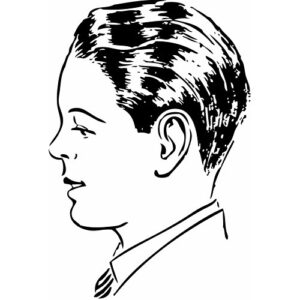
Having muted the television in order to avoid contracting depression from a very popular programme, I couldn’t help noticing, as I peeked over the rim of the newspaper, that there was something compellingly awful about the clutch of young suits and suitinas either sitting at tables or running about. There is always something awful in programmes about success, and the quality of the awfulness never varies, so I should have known better. The table episodes in ‘The Apprentice’, as everyone who owns a television knows, feature Sugar and two lieutenants on one side and, on the other side, suits who have abandoned all distinctiveness in the name of being similar to their peers, only more so.
 It occurred to me that when I was a schoolboy, back in a time when most schoolkids wore uniforms, my friends and I experienced a strong need to distinguish ourselves from the pack. Undeterred by the fact that other pack members were also thus motivated, the members of my group applied themselves to tweaking the uniforms that made them appear uniform.
It occurred to me that when I was a schoolboy, back in a time when most schoolkids wore uniforms, my friends and I experienced a strong need to distinguish ourselves from the pack. Undeterred by the fact that other pack members were also thus motivated, the members of my group applied themselves to tweaking the uniforms that made them appear uniform.
 Ties were knotted inventively and the knots positioned in unusual relationships to the top button of the white shirt. Caps were subjected to distress in ways that costume assistants in movies would respect. Trousers were purchased (by your mother) with less than 16 inch bottoms (your mother was told the limit was 14). Shoes had to Italianise to a point. The look was scruffy with patches of style. Models for the look were Teddy Boys, Tony Curtis, Rockers, Elvis, the hairstyles of Hollywood Romans, Mods, Beats and Artists. Middle class boys, such as myself, were drawn to certain elements of working class grooming, such as hair cream, but found our mothers intransigent in their resistance to the pompadour.
Ties were knotted inventively and the knots positioned in unusual relationships to the top button of the white shirt. Caps were subjected to distress in ways that costume assistants in movies would respect. Trousers were purchased (by your mother) with less than 16 inch bottoms (your mother was told the limit was 14). Shoes had to Italianise to a point. The look was scruffy with patches of style. Models for the look were Teddy Boys, Tony Curtis, Rockers, Elvis, the hairstyles of Hollywood Romans, Mods, Beats and Artists. Middle class boys, such as myself, were drawn to certain elements of working class grooming, such as hair cream, but found our mothers intransigent in their resistance to the pompadour.
We were, of course, cleaving to convention but our conventions were oppositional. Sugar’s suits, on the other hand, are intent on practising a mode of reverse evolution so radical that one wonders if sheer intention could actually effect parthenogenetic regressive restructuring at a molecular level. A key strategy on display appears to be based on the principle that if a rival makes an effective or ineffective move of some sort – it doesn’t matter which – then his associates will exert a form of homeostatic adjustment designed to return the system to a state of equilbrium. Instances of dissident idiosyncrasy that might be viewed as potentially and constructively state-changing are efficiently suffocated in this scheme. The errant suit is not ejected, he is simply divested of his difference. This is not competition.
What’s odd here is that all the participants and ourselves have come to believe that the spectacle is, in fact, based on principles of competition and is therefore exciting. In practice, however, the emanations of the patriarchy are so overwhelming that the suits have prioritised becoming like each other as a means of achieving what is deeply craved: becoming like Lord Sugar. Lord Sugar will note their capacity to be like each other and will understand that, with a modicum of realignment, they can become like him. They will, of course, having achieved this condition, be obedient. The least competitive will be the most powerful if he can suffocate competition in the name of the persistence of the patriarch. This makes for better television than watching silly competitions, even if the event is blazoned as contest essentialised.
It will be argued that I am failing to notice that every single programme features barely concealed ambition, anger and terror in addition to blatant and incontinent self-promotion. My point is that the vocabulary of the combat is exceptionally small and decreases steadily as its founding ideology becomes increasingly pervasive. Although behaviours may seem florid – the attempts to suppress strong unteamly emotion at a facial level are certainly compelling – they are drawn from such an impoverished stock that their degree of difference, even when counterpointed, is minimal. Border skirmishes are the order of the day, fully mobilised wars are relegated to video games.
 The watery-eyed, puff-cheeked, sidelong-glancing novices are actually much more accomplished team-members than they privately would wish to concede. They share a passionate allegiance to the process of abjection by self-promotion. The latter comprises an incantatory series of profoundly abasing assertions of their value in the baldest terms. This is the equivalent of writing your own references. Once the principle of self-commendation is accepted, difference is made obsolete and collapses. This style of self-abasement is clearly intoxicating insofar as the practitioners are able to overlook its resemblance to the canine practice of offering the arse up for sniffing.
The watery-eyed, puff-cheeked, sidelong-glancing novices are actually much more accomplished team-members than they privately would wish to concede. They share a passionate allegiance to the process of abjection by self-promotion. The latter comprises an incantatory series of profoundly abasing assertions of their value in the baldest terms. This is the equivalent of writing your own references. Once the principle of self-commendation is accepted, difference is made obsolete and collapses. This style of self-abasement is clearly intoxicating insofar as the practitioners are able to overlook its resemblance to the canine practice of offering the arse up for sniffing.
31.10. 2010

